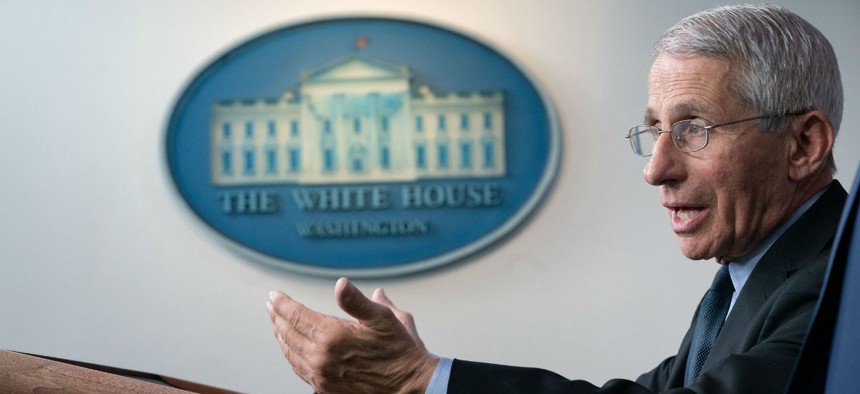
Dr. Anthony Fauci, director of the National Institute of Allergy and Infectious Diseases, discusses the coronavirus outbreak at a White House briefing on March 16. Official White House Photo by D. Myles Cullen
New White House Guidance Says Agencies Should ‘Minimize Face-to-Face Interactions’
The Office of Management and Budget said the government must continue to operate through the COVID-19 pandemic.
The Trump administration issued new guidance late Tuesday evening calling on agencies to “minimize face-to-face interactions” to combat the novel coronavirus, while ensuring the government continues to function.
Acting Office of Management and Budget Director Russell Vought sent memoranda to heads of departments and agencies to supplement President Trump’s new guidelines on how to slow the spread of the outbreak. Within the next two days, all agencies must review and modify their coronavirus policies. Also, agency leaders must ensure they are able to deliver mission critical functions and other essential government services (such as border protection, postal delivery, air traffic control, medical services and tax collection), he said.
“Exceptions may be needed when continued operations and services are necessary to protect public health and safety, including law enforcement and criminal-justice functions,” wrote Vought, in reference to personal interactions. “Non-mission-critical functions that cannot be performed remotely or that require in-person interactions may be postponed or significantly curtailed. Agency heads have flexibility to realign individuals or work units to higher priority activities.”
The memo calls for maximum use of telework for employees and contractors, re-prioritization of non-mission critical services, communication with customers about potentially delayed services, and streamlining of regulations to approve critical services where appropriate. It also directs agencies to take steps to ensure employees infected with the virus or those most vulnerable don’t enter federal facilities and more.
Despite numerous guidance iterations from OMB and the Office of Personnel Management, many federal employees still fear their agencies are not protecting them from the coronavirus by not fully embracing telework wherever possible. Many readers have reached out to Government Executive in recent days with questions and concerns about their agencies’ efforts—or apparent failures—to protect employees:
- “It’s been a “demoralizing, anxiety driven time, made worse by the realization that we work tirelessly to serve the American public for an employer who does not consider our lives worthy of the simplest protections.”
- “My supervisor decided to initiate a telework agreement. The agreement is for 4 hours of my typical 8 hour day. I work in HR. Does this really meet the intent of the CDC and OPM’s ‘maximum telework’ policy to mitigate risk of exposure/transmission of COVID-19?”
- “It is not our fault this pandemic has occurred yet we have families we are coming home to not knowing what we have been exposed to. We are being discriminated against due to not being able to telework and therefore putting ourselves and our families at risk.”
- “The President said no gatherings over 10 people, but thinks nothing of 400 federal employees working in the same space every day.”
- “I am very concerned [that] they have not supplied sanitizer, wipes and gloves to us employees … We constantly go to the printers, fax machines and answer calls/ telephones on a daily basis, touching everything throughout the day.”
Vought said the guidance aligns with the Centers for Disease Control and Prevention recommendations (including “social distancing” to mitigate spread of germs) and the president's declaration of a national emergency on Friday that invoked the 1988 Stafford Act for emergency management.
The OMB memo was issued shortly after OPM Director Dale Cabaniss resigned unexpectedly late Tuesday. Cabaniass was a major part of the administration’s efforts to protect agencies and employees during this global pandemic.







